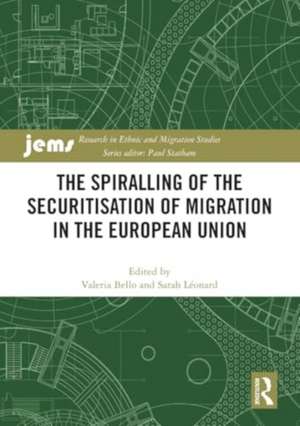The Spiralling of the Securitisation of Migration in the European Union: Research in Ethnic and Migration Studies
Editat de Valeria Bello, Sarah Léonarden Limba Engleză Paperback – 9 oct 2024
| Toate formatele și edițiile | Preț | Express |
|---|---|---|
| Paperback (1) | 382.75 lei 6-8 săpt. | |
| Taylor & Francis – 9 oct 2024 | 382.75 lei 6-8 săpt. | |
| Hardback (1) | 866.97 lei 3-5 săpt. | +22.86 lei 7-13 zile |
| Taylor & Francis – 31 mar 2023 | 866.97 lei 3-5 săpt. | +22.86 lei 7-13 zile |
Din seria Research in Ethnic and Migration Studies
- 9%
 Preț: 934.96 lei
Preț: 934.96 lei - 17%
 Preț: 268.36 lei
Preț: 268.36 lei - 17%
 Preț: 178.76 lei
Preț: 178.76 lei - 14%
 Preț: 299.52 lei
Preț: 299.52 lei - 17%
 Preț: 184.81 lei
Preț: 184.81 lei -
 Preț: 383.04 lei
Preț: 383.04 lei -
 Preț: 384.22 lei
Preț: 384.22 lei -
 Preț: 382.36 lei
Preț: 382.36 lei - 17%
 Preț: 257.90 lei
Preț: 257.90 lei - 17%
 Preț: 258.50 lei
Preț: 258.50 lei - 18%
 Preț: 1000.93 lei
Preț: 1000.93 lei - 26%
 Preț: 766.12 lei
Preț: 766.12 lei - 18%
 Preț: 894.21 lei
Preț: 894.21 lei -
 Preț: 383.71 lei
Preț: 383.71 lei - 18%
 Preț: 892.65 lei
Preț: 892.65 lei - 18%
 Preț: 890.74 lei
Preț: 890.74 lei - 18%
 Preț: 1004.68 lei
Preț: 1004.68 lei - 20%
 Preț: 259.72 lei
Preț: 259.72 lei - 18%
 Preț: 1000.93 lei
Preț: 1000.93 lei - 18%
 Preț: 1001.21 lei
Preț: 1001.21 lei - 18%
 Preț: 1004.24 lei
Preț: 1004.24 lei - 18%
 Preț: 1004.55 lei
Preț: 1004.55 lei - 18%
 Preț: 955.93 lei
Preț: 955.93 lei - 9%
 Preț: 934.43 lei
Preț: 934.43 lei - 18%
 Preț: 998.88 lei
Preț: 998.88 lei - 9%
 Preț: 935.79 lei
Preț: 935.79 lei
Preț: 382.75 lei
Nou
Puncte Express: 574
Preț estimativ în valută:
73.24€ • 76.47$ • 60.61£
73.24€ • 76.47$ • 60.61£
Carte tipărită la comandă
Livrare economică 05-19 aprilie
Preluare comenzi: 021 569.72.76
Specificații
ISBN-13: 9781032433240
ISBN-10: 1032433248
Pagini: 168
Dimensiuni: 174 x 246 mm
Greutate: 0.29 kg
Ediția:1
Editura: Taylor & Francis
Colecția Routledge
Seria Research in Ethnic and Migration Studies
Locul publicării:Oxford, United Kingdom
ISBN-10: 1032433248
Pagini: 168
Dimensiuni: 174 x 246 mm
Greutate: 0.29 kg
Ediția:1
Editura: Taylor & Francis
Colecția Routledge
Seria Research in Ethnic and Migration Studies
Locul publicării:Oxford, United Kingdom
Public țintă
Academic, Postgraduate, Undergraduate Advanced, and Undergraduate CoreCuprins
1. Introduction— The spiralling of the securitisation of migration in the EU: from the management of a ‘crisis’ to a governance of human mobility? 2. From Mobility Partnerships to Migration Compacts: security implications of EU- Jordan relations and the informalization of migration governance 3. The ‘refugee crisis’ and its transformative impact on EU- Western Balkans relations 4. People as security risks: the framing of migration in the UK security- development nexus 5. The EU and migration in the Mediterranean: EU borders’ control by proxy 6. The securitisation of migration in the European Union: Frontex and its evolving security practices 7. EU border technologies and the co- production of security ‘problems’ and ‘solutions’ 8. Overcoming borders: the Europeanization of civil society activism in the ‘refugee crisis’ 9. The role of non- state actors’ cognitions in the spiralling of the securitisation of migration: prejudice, narratives and Italian CAS reception centres
Notă biografică
Valeria Bello is Associate Professor of Sociology and Director of the Masters programme in Advanced Studies in International Affairs at the Blanquerna School of Communication and International Relations, University Ramón Llull, Barcelona, Spain.
Sarah Léonard is Professor of International Security at the University of the West of England, UK.
Sarah Léonard is Professor of International Security at the University of the West of England, UK.
Descriere
This book investigates how migration has been transformed into a security threat in Europe. It argues that this process has taken place through a self-fulfilling spiralling process, which involves different actors and their specific narratives, practices and policies.
